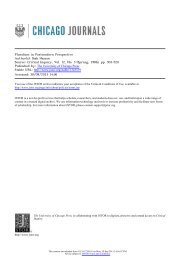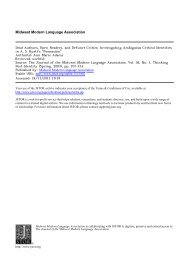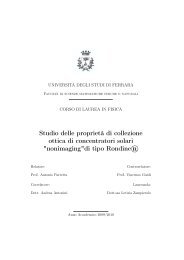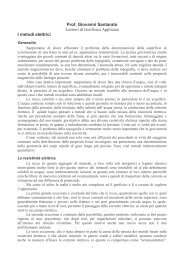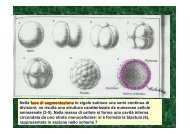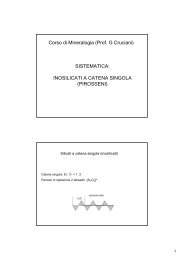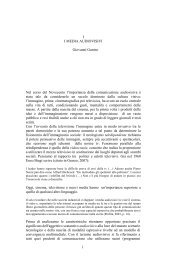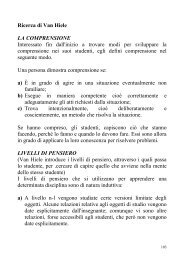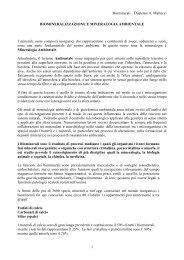Gestus and Signature in Aphra Behn's the Rover
Gestus and Signature in Aphra Behn's the Rover
Gestus and Signature in Aphra Behn's the Rover
Create successful ePaper yourself
Turn your PDF publications into a flip-book with our unique Google optimized e-Paper software.
<strong>the</strong>m <strong>and</strong>, it would seem, <strong>the</strong> woman author: "Can any see that<br />
glorious sight <strong>and</strong> say / A woman shall not prove Victor today?"<br />
(3:286) The "glorious sight" is, once aga<strong>in</strong>, <strong>the</strong> fetishized, commodified<br />
representation of <strong>the</strong> female, st<strong>and</strong><strong>in</strong>g on <strong>the</strong> forestage, sitt<strong>in</strong>g<br />
<strong>in</strong> <strong>the</strong> pit, <strong>and</strong> soon to be <strong>in</strong>scribed as author of a pr<strong>in</strong>ted play. If this<br />
fasc<strong>in</strong>at<strong>in</strong>g moment-<strong>in</strong> which a woman speak<strong>in</strong>g a woman's l<strong>in</strong>es<br />
summons <strong>the</strong> regard of o<strong>the</strong>r women-seems to put a female gaze<br />
<strong>in</strong>to operation, it also re<strong>in</strong>forces <strong>the</strong> misogynist circuitry of <strong>the</strong> <strong>the</strong>ater<br />
apparatus: that which cha<strong>in</strong>s actress to vizard-mask to author.<br />
At <strong>the</strong> outset of this essay we asked how <strong>Aphra</strong> Behn encodes <strong>the</strong><br />
literary <strong>and</strong> <strong>the</strong>atrical conditions of her production. <strong>Behn's</strong><br />
"Postscript" to <strong>the</strong> published text of The <strong>Rover</strong> provides a possible<br />
answer. She compla<strong>in</strong>s that she has been accused of plagiariz<strong>in</strong>g<br />
Killigrew simply because <strong>the</strong> play was successful <strong>and</strong> she a woman.<br />
Yet while claim<strong>in</strong>g to be "va<strong>in</strong>ly proud of [her] judgment" <strong>in</strong> adapt<strong>in</strong>g<br />
Thomaso, she "hang[s] out <strong>the</strong> sign of Angellica (<strong>the</strong> only stolen<br />
object) to give notice where a great part of <strong>the</strong> wit dwelt" (130).<br />
This compliment to Killigrew may also <strong>in</strong>dicate what compelled<br />
Behn to embark on this adaptation. The "sign[s] of Angellica" both<br />
constitute <strong>and</strong> represent <strong>the</strong> <strong>the</strong>ater apparatus, serv<strong>in</strong>g as metacritical<br />
commentary on its patriarchal economy, its habits of fetishistic<br />
consumption. They may also constitute <strong>Behn's</strong> authorial signature,<br />
what Miller calls <strong>the</strong> "material ... brutal traces of <strong>the</strong> culture of<br />
gender" (275). As a woman writer <strong>in</strong> need of money, Behn was<br />
vulnerable to accusations of immodesty; to write meant to expose<br />
herself, to put herself <strong>in</strong>to circulation; like Angellica, to sell her<br />
wares. Is it merely a co<strong>in</strong>cidence that Angellica Bianca shares<br />
<strong>Aphra</strong> <strong>Behn's</strong> <strong>in</strong>itials, that hers is <strong>the</strong> only name from Thomaso that<br />
Behn leaves unchanged?<br />
The "signs of Angellica" not only help us specify <strong>the</strong> place of this<br />
important woman dramatist <strong>in</strong> Restoration cultural practice, <strong>the</strong>y<br />
<strong>in</strong>vite us to historicize <strong>the</strong> critique of fetishization that has <strong>in</strong>formed<br />
so much fem<strong>in</strong>ist criticism <strong>in</strong> <strong>the</strong> last decade.38 Certa<strong>in</strong>ly <strong>the</strong> conditions<br />
of women writers have changed s<strong>in</strong>ce <strong>the</strong> Restoration, but<br />
<strong>the</strong> fetishistic features of <strong>the</strong> commercial <strong>the</strong>ater have rema<strong>in</strong>ed<br />
remarkably similar. Now as <strong>the</strong>n <strong>the</strong> <strong>the</strong>ater apparatus is geared to<br />
profit <strong>and</strong> pleasure, <strong>and</strong> overwhelm<strong>in</strong>gly controlled by males. Now<br />
as <strong>the</strong>n <strong>the</strong> arrangement of audience to stage produces what Brecht<br />
calls a "cul<strong>in</strong>ary" or ideologically conservative spectator, <strong>in</strong>tellectually<br />
passive but scopically hungry, eager for <strong>the</strong> next turn of <strong>the</strong><br />
536 <strong>Gestus</strong> <strong>and</strong> <strong>Signature</strong> <strong>in</strong> The <strong>Rover</strong><br />
This content downloaded by <strong>the</strong> authorized user from 192.168.82.209 on Sun, 18 Nov 2012 16:18:52 PM<br />
All use subject to JSTOR Terms <strong>and</strong> Conditions



